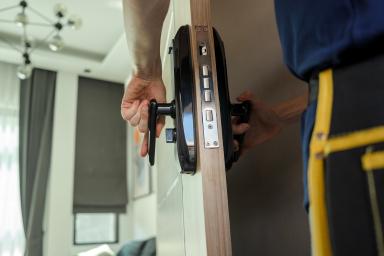Tips for starting a business with a disability
Realising your dream of starting a business offers the chance to create a venture that better suits your abilities and lifestyle, and gives you control over how, where and when you work.
Starting a business, no matter your ability can be daunting. However, an extensive network of organisations, funding, and support is available for anyone with a disability to help bring their business idea to life.
Getting your idea off the ground involves several steps, from writing a business plan and conducting market research to securing funding and choosing the right business structure.
Not every step will be relevant to your business.
If you have a physical or mental disability, you may want to consider where to find specialist funding, support and plan the type of business you could start that best suits your lifestyle.
Start Up Loans has also partnered with the Royal National Institute of Blind People (RNIB) to support blind and partially sighted people to participate equally in launching businesses. Find out more about the Start Up Loans partnership with the RNIB.
Finding funding
Launching a new venture can involve some costs.
There are businesses, such as freelance content creation or online tutoring, that may involve little initial expenditure, while other ventures, such as building an ecommerce shop, involve more upfront costs.
Benefits tailored to people with disabilities in work are available through schemes such as the Disabled Person’s Tax Credit (PDF, 365 KB - opens in new window) and the Access to Work scheme.
Both are available if you’re self-employed, such as working as a sole trader or freelancer.
There are other schemes available that offer a mix of grants, investments, and awards suitable for start-up owners who have a disability, such as:
- RNIB grants – the RNIB offers grants that can help towards buying equipment such as voice recorders and Dictaphones if required for your start-up
- Fredericks Foundation – the charity provides support and funding for disadvantaged people looking to start up or expand their business and covers the south of England
- Stelios Award for Disabled Entrepreneurs – launching in spring 2022, this award offers prizes up to £30,000 for disabled entrepreneurs who want to launch a business or have recently launched and are looking for a funding boost
- Disabled facilities grants – a Government grant that enables disabled entrepreneurs to adapt their homes. The amount of loan available depends on the UK country you’re based in
- Kaleidoscope Investments – part of the Disabled Entrepreneurs group that provides investment and advice for disabled people looking to start a business
- Prince’s Trust business support – the scheme aims to help 18-30 year-olds start a business through available workshops
- Start Up Loans – access a Government-backed personal loan up to £25,000 with a fixed interest rate of 6%. Includes free application support and post-loan support and mentoring.
Finding support
There are many organisations that you can turn to for support when starting a business.
Charities such as the RNIB, Mind and Scope provide access to advice, inspiration and support for people who want to work for themselves and make a profit.
The RNIB, for example, has a helpful guide to becoming self-employed if you have sight loss, including advice on developing your business plan along with the skills and abilities you should consider when identifying the type of self-employment that would suit you.
Regional support is available that can provide more localised, tailored support for your business, including:
- growth hubs – providing local and national business support, there are 38 Growth Hubs located across the UK.
- regional support lines – access support lines depending on the UK country your start-up is based in and speak to an advisor about any matter concerning your business.
- organisations – such as Business Disability Forum offer advice services for disabled entrepreneurs who may need assistance.
- Disabled Entrepreneurs Network – access networking and information tailored to self-employed disabled people setting up a business.
- Business Disability Forum – tailored to the 26m people in the UK who have a disability covering practical advice and networking.
Starting a business
There are many useful articles on the Start Up Loans website that could help you get your business off the ground from inspiring business ideas, making sure you have everything you need for launch, marketing help, and lots more.
Learn with Start Up Loans and help get your business off the ground
Thinking of starting a business? Check out our free online courses in partnership with the Open University on being an entrepreneur.
Our free Learn with Start Up Loans courses include:
- Entrepreneurship – from ideas to reality
- First steps in innovation and entrepreneurship
- Entrepreneurial impressions – reflection
Plus free courses on climate and sustainability, teamwork, entrepreneurship, mental health and wellbeing.
Tags related to this content:
Disclaimer: The Start -Up Loans Company makes reasonable efforts to keep the content of this article up to date, but we do not guarantee or warrant (implied or otherwise) that it is current, accurate or complete. This article is intended for general information purposes only and does not constitute advice of any kind, including legal, financial, tax or other professional advice. You should always seek professional or specialist advice or support before doing anything on the basis of the content of this article.
The Start-Up Loans Company is not liable for any loss or damage (foreseeable or not) that may come from relying on this article, whether as a result of our negligence, breach of contract or otherwise. “Loss” includes (but is not limited to) any direct, indirect or consequential loss, loss of income, revenue, benefits, profits, opportunity, anticipated savings, or data. We do not exclude liability for any liability which cannot be excluded or limited under English law. Reference to any person, organisation, business, or event does not constitute an endorsement or recommendation from The Start-Up Loans Company, its parent company British Business Bank plc, or the UK Government.
Your previously read articles
Sign up for our newsletter
Just add your details to receive updates and news from Start Up Loans
Sign up to our newsletter


